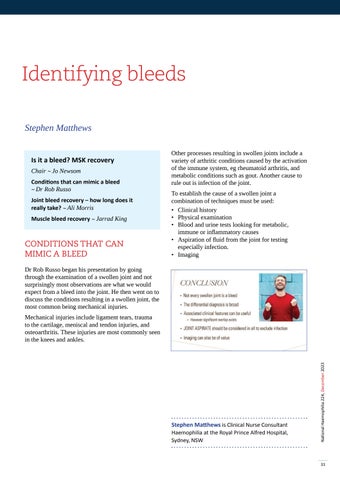Identifying bleeds Stephen Matthews Is it a bleed? MSK recovery Chair ~ Jo Newsom Conditions that can mimic a bleed ~ Dr Rob Russo Joint bleed recovery – how long does it really take? ~ Ali Morris Muscle bleed recovery ~ Jarrad King
CONDITIONS THAT CAN MIMIC A BLEED
Other processes resulting in swollen joints include a variety of arthritic conditions caused by the activation of the immune system, eg rheumatoid arthritis, and metabolic conditions such as gout. Another cause to rule out is infection of the joint. To establish the cause of a swollen joint a combination of techniques must be used: • Clinical history • Physical examination • Blood and urine tests looking for metabolic, immune or inflammatory causes • Aspiration of fluid from the joint for testing especially infection. • Imaging
Dr Rob Russo began his presentation by going through the examination of a swollen joint and not surprisingly most observations are what we would expect from a bleed into the joint. He then went on to discuss the conditions resulting in a swollen joint, the most common being mechanical injuries.
Stephen Matthews is Clinical Nurse Consultant Haemophilia at the Royal Prince Alfred Hospital, Sydney, NSW
National Haemophilia 224, December 2023
Mechanical injuries include ligament tears, trauma to the cartilage, meniscal and tendon injuries, and osteoarthritis. These injuries are most commonly seen in the knees and ankles.
31











